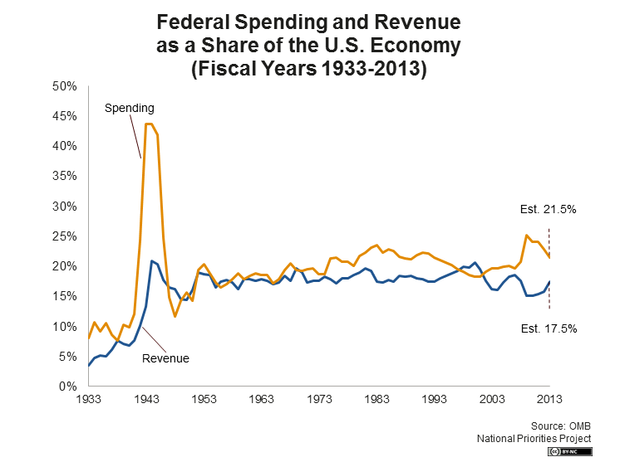Federal Spending Fact Sheet
Aug. 1, 2013 - Download PDF Version
Key Facts
Federal Spending Affects You
The federal budget is made of your tax dollars and it reaches your neighborhood with paved highways, clean drinking water, public transportation, and law enforcement, among many other things.
Big Ticket Items
This year the federal government will spend around $3.8 trillion – nearly a quarter of the U.S. economy. Social Security, health care programs, the military, and interest on federal debt together account for nearly 70 percent of all federal spending. Domestic programs in the discretionary budget – like transportation, education, and welfare – account for around 13 percent of all federal spending.
Investment Needed
Crumbling roads and bridges and other infrastructure in the U.S. require an investment of $3.6 trillion, according to the American Society of Civil Engineers. Meanwhile student loans for higher education now exceed $1 trillion even as college tuition keeps rising, and natural disasters like Hurricane Sandy are striking more often – and most communities are woefully unprepared.
Cuts In Progress
The across-the-board cuts of sequestration are currently reducing funding for nearly every domestic program – things like environmental protection, grants to states for infrastructure improvements and disaster preparedness, and funding for underserved school districts – as well funding for the Department of Defense. These cuts are the result of Washington’s focus on deficit reduction.
What's Happening Now
The Obama Administration has proposed the creation of a Community College to Career Fund to train unemployed workers for high-skilled jobs. The president has also proposed universal prekindergarten education, to ensure that every small child has access to a quality learning environment. Funding for such initiatives has yet to be made available by Congress.

What to Ask Your Legislator
How are you balancing policies to invest in our country’s future with Washington’s current emphasis on deficit reduction? What are opportunities for bipartisan cooperation to get the budget process back on track?